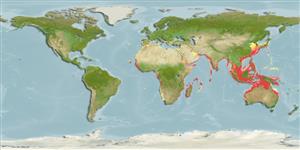Common names from other countries
Lớp phụ Cá sụn (cá mập và cá đuối) (sharks and rays) >
Carcharhiniformes (Ground sharks) >
Carcharhinidae (Requiem sharks)
Etymology: Rhizoprionodon: rhiza (Gr.), root; prion (Gr.) saw; odon (Gr.), tooth, referring to teeth with serrated (saw-like) bases, or roots [replacement name for Rhizoprion Ogilby 1915, preoccupied by Rhizoprion Jourdan 1861 in mammals]. (See ETYFish); acutus: Latin for sharp or pointed, probably referring to narrow, pointed snout. (See ETYFish).
More on author: Rüppell.
Environment: milieu / climate zone / depth range / distribution range
Sinh thái học
Biển; Nước ngọt; Thuộc về nước lợ Sống nổi và đáy; sống cả ở nước ngọt và nuớc mặn (Ref. 51243); Mức độ sâu 1 - 200 m (Ref. 244). Tropical; 41°N - 30°S, 27°W - 156°E
Eastern Atlantic: Madeira and Mauritania to Angola (Ref. 244). Indo-West Pacific: Persian Gulf (Ref. 68964), Red Sea and East Africa to Indonesia, north to Japan, south to Australia. Also reported from Gulf of Taranto in Mediterranean Sea (Ref. 231).
Length at first maturity / Bộ gần gũi / Khối lượng (Trọng lượng) / Age
Maturity: Lm 75.0, range 70 - 80 cm
Max length : 175 cm TL con đực/không giới tính; (Ref. 12693); 80.8 cm TL (female); common length : 110 cm TL con đực/không giới tính; (Ref. 47737); Khối lượng cực đại được công bố: 5.0 kg (Ref. 40637); Tuổi cực đại được báo cáo: 8 các năm (Ref. 244)
Các tia vây lưng cứng (tổng cộng) : 0; Tia cứng vây hậu môn: 0. A small shark with a long, narrow, snout, big eyes without notches, long labial furrows, and oblique-cusped teeth which may be smooth-edged or weakly serrated; 2nd dorsal fin small, low and behind larger anal fin; no interdorsal ridge (Ref. 5578). Grey or grey-brown above, white below (Ref. 5578). Dorsal and anal fins with dusky or blackish edges, fins slightly darker than back (Ref. 9997).
Found on continental shelves, often on sandy beaches and rarely in estuaries (Ref. 244). Reported to enter freshwater and recorded several times from Cambodia as far upstream as the Great Lake (Ref. 12693). Occurs near the surface in shallow waters (Ref. 12693). Feeds mainly on small pelagic and benthic bony fishes, also cephalopods and other invertebrates (Ref. 244). Viviparous (Ref. 50449). Utilized fresh and possibly dried salted for human consumption and for fishmeal (Ref. 9997). The 178 cm specimen recorded off Africa is possibly based on some other species (Ref. 9997).
Distinct pairing with embrace (Ref. 205). Viviparous, with a yolk-sac placenta; 2 to 8 in a litter (Ref. 9997), usually 2 to 5 after a gestation period of ~ 12 months; no seasonality in the reproductive cycle (Ref.58048). Size at birth between 25 and 39 cm.
Compagno, L.J.V., 1984. FAO Species Catalogue. Vol. 4. Sharks of the world. An annotated and illustrated catalogue of shark species known to date. Part 2 - Carcharhiniformes. FAO Fish. Synop. 125(4/2):251-655. Rome: FAO. (Ref. 244)
IUCN Red List Status (Ref. 130435)
Human uses
Các nghề cá: Tính thương mại; cá để chơi: đúng
Các công cụ
Special reports
Download XML
Các nguồn internet
Estimates based on models
Preferred temperature (Ref.
115969): 19.6 - 28.5, mean 26.9 (based on 1463 cells).
Phylogenetic diversity index (Ref.
82804): PD
50 = 0.5078 [Uniqueness, from 0.5 = low to 2.0 = high].
Bayesian length-weight: a=0.00339 (0.00273 - 0.00421), b=3.08 (3.04 - 3.12), in cm Total Length, based on LWR estimates for this species (Ref.
93245).
Mức dinh dưỡng (Ref.
69278): 4.3 ±0.4 se; based on diet studies.
Thích nghi nhanh (Ref.
120179): Rất thấp, thời gian nhân đôi của chủng quần tối thiểu là hơn 14 năm (K=0.2-0.6; Fec=1).
Fishing Vulnerability (Ref.
59153): High vulnerability (61 of 100).
